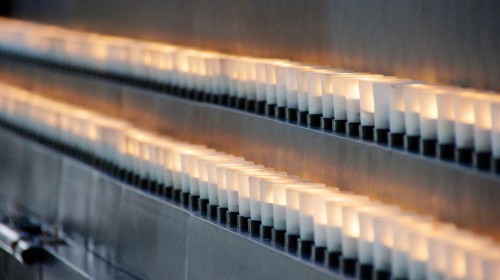19th May 2014 London, UK
Remembrance on the way to the coffee shop (what connects IHRA and R2P?)

My department moved offices last week – from rooms “in need of modernisation” on the third floor of the Foreign and Commonwealth Office, down to freshly refurbished accommodation on the grand first floor. We’re more densely packed down there (“warm-desking”), but morale is high and the coffee shop closer.
My new route to mid-morning latte takes me past a bronze sculpture I had not noticed before. The FCO is full of history – some of it indecipherable; some of it painfully familiar (like the plaque for colleagues who died in the bombing of our Istanbul Consulate). This newly noticed memorial turned out to be to members of the Diplomatic Service who had saved Jews from the Holocaust.
I studied it with interest because I was on my way to a meeting of the International Holocaust Remembrance Alliance (IHRA), which the UK chairs this year. Later that evening I attended a seminar about Jan Karski, a diplomat who warned his government in exile and the Allies about death camps in occupied Poland.
The debate suggested that the Allies could not have saved millions. At the time Karski raised the alarm the battle of El Alemein was in the future, the Russian Army was in retreat on the Eastern Front, there were no British or American soldiers on the continent of Europe, and we had no fighters capable of escorting bombers as far as Auschwitz.
But we might have saved thousands. That the Holocaust ran its course was partly a failure of imagination. When Karski’s story was published in British newspapers, most people found it impossible to believe.
If we couldn’t believe it then, with the horrors of war all around, how much harder for people to comprehend today – so that we stand a better chance of preventing the next atrocity to follow in its wake, like the genocide in Rwanda (a twentieth anniversary marked last month in the UN Security Council).
That’s why IHRA’s work is so important – to ensure that the Holocaust is believed, taught and stared in the face. It’s no easy task, our conference showed, even for the self-selecting group of IHRA member states. A delegate from central Europe explained contemporary problems by referring to his region’s “twisted history”. He contrasted it with the UK’s history, which had run “straight ahead since at least 1066”.
That was intended and taken as a compliment. But it has not felt straightforward to the inhabitants of these islands. Nor, in the present, to parents who want to help their children learn from history, including the Holocaust. I asked a member of the UK delegation who is a Holocaust Survivor whether I could bring my boys when I visited his house – to hear his story. I told him they were nine and ten. He urged me not to bring them. They were too young to benefit from an account of murder on an industrial scale.
And the judgement calls in foreign policy over when and how to intervene are not straightforward either; witness the controversy around “Responsibility to Protect” (R2P). This week, addressing the FCO’s Leadership Conference, the Foreign Secretary instanced a country which “shares our values but not our foreign policy.” It protects the human rights of its own citizens, but declines to “interfere” in the domestic affairs of others, not even by supporting resolutions at the UN Human Rights Council.
We were talking about an “Emerging Power”. We worry that, when such countries have “emerged”, with the clout to change the “rules of the game”, they may have forgotten the horrors that drove those who gave us the Universal Declaration of Human Rights. Against that day, the scholars, activists and educators who sustain IHRA deserve our support and gratitude.